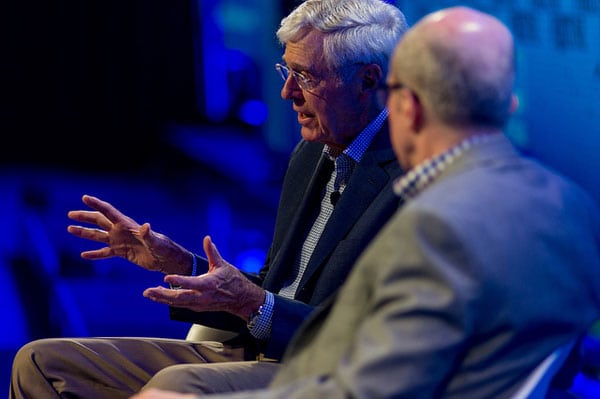
July 24, 2018; Wall Street Journal and Inside Higher Ed
Amid the ongoing controversy at George Mason University, which NPQ has been following, the Charles Koch Foundation has changed course and says it will, going forward, make public the details and conditions of its multi-year grants to colleges and universities. Previously, such matters had been kept out of the public eye, leading to accusations that the Foundation was harming academic freedom and using its financial muscle to impose its conservative political philosophy on its grantees.
The Foundation has been a major funder of higher education. In 2016, it gave a total of $77 million, of which a little more than $51 million went to support more than 300 schools. In a recent open letter posted on the Foundation’s website, Charles Koch explained the motivations behind his academic philanthropy:
We currently support about 1,000 faculty members and are open to assisting even more. As demand for our support for students, professors, scholars, and universities continues to grow, I’ve been happy to increase my giving.…The common thread in my support is the recognition that when people collaborate to understand and remove injustice we all benefit.
Until now, the Foundation had stood by its right to keep the specifics of these grants private. Academic leaders had defended their role in these transactions as well, claiming that secrecy was necessary to protect the privacy of their donors, without which contributions would be lost. When grant details did see the light of day, protests often followed. Critics alleged that the Foundation had placed secret strings on their generosity that would let them influence the selection of academic personnel, course curricula, and research agendas.
Sign up for our free newsletters
Subscribe to NPQ's newsletters to have our top stories delivered directly to your inbox.
By signing up, you agree to our privacy policy and terms of use, and to receive messages from NPQ and our partners.
Trying to change the narrative, Brian Hooks, the foundation’s president, told the Wall Street Journal that “there has been a lot of mischaracterization of our grants in the past. The opportunity to be crystal-clear about how our foundation interacts with universities is a good opportunity.” The Foundation will now make details of all future multi-year grants public, but it is not opening its files on current and past grants, including those that have been at the center of campus controversies.
The Foundation has also tried to make clearer how it selects projects to fund by publishing its guiding “giving principles” on its website. Expressing no political direction, it affirms that “faculty call the shots” and that “schools provide the academic environment.” In providing funding, the Foundation wants to “support scholars who tackle the hard challenges…discover new ways to realize social progress—toward a society of mutual benefit where people succeed by helping others improve their lives. Our giving is meant to have an impact on the world, not produce research that sits on a shelf.” Proposals are ostensibly evaluated on their academic merit using “criteria that include relevance, research rigor, applicant excellence in the field of study, contribution to undergraduate and/or graduate student experience, stakeholder and institutional support, and the potential future growth of the work.”
As open and politically bland as this sounds, critics remain skeptical that the Foundation has given up its desire to support the political efforts of the Koch brothers. Ralph Wilson, spokesperson for UnKoch My Campus, told Inside Higher Ed that unless Koch serves up the details about extant arrangements, what’s being served up isn’t clarity, but “a strategic pivot to distract from the ways in which past and current donor agreements continue to violate academic principles and policies on potentially hundreds of campuses, and they are proposing that they be allowed to continue leveraging that influence for private gain.”
As controversy over the conditions of Koch Foundation grants to George Mason University boiled over last spring, George Mason President Ángel Cabrera wrote in a blog post, “Certainly greater transparency is needed, as is more clarity on how best to engage donors in an academic setting where intellectual freedom is paramount.” While denying that the university had allowed the Foundation too much influence, he did recognize that the secret conditions did fall “short of the standards of academic independence I expect any gift to meet.”
The Koch Foundation’s new commitment to transparency is a step toward ensuring a higher standard of academic protection for future giving. But the lack of full transparency on past gifts creates doubt about damage done previously. Hopefully, the Koch Foundation will address these concerns as well, and in doing so set a standard that other foundations and donors will also be expected to meet.—Martin Levine












